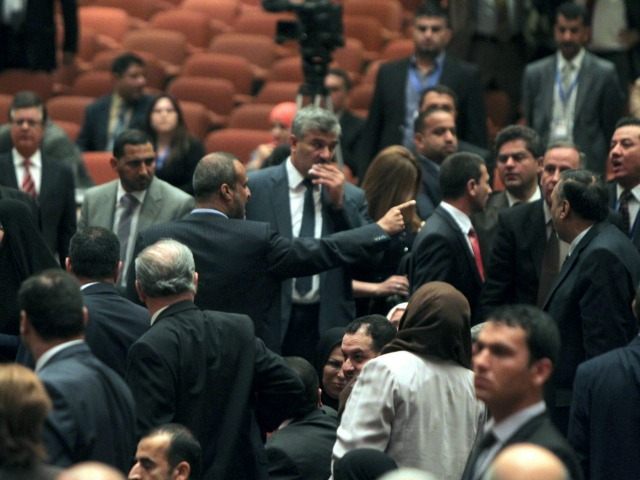Protests by Sunni Muslim members of parliament (MPs) in Iraq reportedly prompted the country’s parliament to suspend its meeting Tuesday.
The Iraqi Sunnis are boycotting the parliament and government over violence that targeted their community in the eastern part of the country and left dozens dead in what is believed to be retaliation for anti-Shi’ite bombings claimed by the Sunni jihadist group Islamic State (ISIS/ISIL).
“Sunni lawmakers urged Prime Minister [PM] Haider al-Abadi to disband and disarm the Shi’ite militias which they accuse of being behind the latest attacks in and around the town of Muqdadiya, 80 kilometers (50 miles) northeast of Baghdad,” reports Reuters.
“Raad al-Dahlaki and Nahida al-Daini, two Sunni MPs from Diyala province where Muqdadiya is located, said 43 people had been killed over the past week and nine mosques fire bombed. Salah Muzahim, another MP, said the toll was over 40 dead,” it adds.
The Associated Press (AP) quotes Dahlaki as saying that the Sunnis will only boycott Tuesday’s session of parliament, demanding government action against the culprits.
AP reports, “The announcement Tuesday comes after angry [Shi’ite] mobs attacked several Sunni mosques and businesses in the majority Shiite town of Muqdadiyah.”
Long-running sectarian conflict in Iraq, primarily between the Shi’ite majority and Sunni minority, has been exacerbated by the rise of ISIS, explains Reuters.
Iraq’s Prime Minister Haider al-Abadi, described as a “moderate Shi’ite” in the report, is trying to restore relations with the Sunnis and win them over to root out ISIS out of the primarily Sunni-majority territory the terrorist group seized in 2014 in northern and western Iraq.
“These killings are hindering Abadi’s efforts to rebuild trust with the Sunnis which is essential to recover territory under ISIS control,” Mona Alami, a Beirut-based analyst with the Atlantic Council think tank, told Reuters.
“The Iraqi Forces Coalition… as the representative of the Sunni component in Iraq, announces… its members’ boycott of the next two sessions of parliament and government in condemnation of what is happening in Muqdadiya,” reportedly said a statement read by MP Ahmed Masari.
“We demand the dissolution and disarmament of the (Shi’ite) militias,” the statement added. Lawmakers met briefly on Tuesday and decided to adjourn until Thursday.
An official count for Sunni casualties in Muqdadiya and neighboring villages has not been published by Iraq’s Interior Ministry.
Reuters notes that the ministry’s spokesman was not available for comment on the latest violence.
The Iran-backed Badr Organization, which is the dominant Shi’ite militia in Diyala province, rebuffed the casualty figures voiced by the Sunni MPs.
“Yes, there are people killed but this number is exaggerated,” Mohammed Naji, an aide to Badr leader Hadi al-Amiri, told Reuters.
“He described the attacks on Sunni mosques as violations by people who want to stir up sectarian tension in Diyala, which lies between Baghdad and the Iranian border and has a mixed population of Shi’ites and Sunnis,” notes Reuters. “At the height of Iraq’s civil war nearly a decade ago, such violence often unleashed revenge killings and counter attacks across the country.”
ISIS claimed responsibility for two blasts last week that killed 23 people near a coffee in Muqdadiya where Shi’ites often meet. That resulted in Shi’ite militiamen being deployed to the area out of concern that their community was targeted by the terrorist group.
Reuters quotes Dahlaki and Daini as saying that “the level of violence has receded but tension remains with the town still under the control of Shi’ite militiamen.”
“Badr Organization has established itself as the ascendant militia in the region since rolling back Islamic State’s advance,” reports Reuters. “Amiri last week expressed regret over the violence in Diyala and offered to rebuild the destroyed Sunni mosques there.”
Some analysts believe the Iraqi Sunni population was disenfranchised under the Shi’ite dominated government of former PM Nouri al-Maliki, who remains part of the government as vice president of Iraq after the Obama administration pressured him to resign as PM.
As secretary-general of the Islamic Dawa Party, he is the top player of the Shi’ite political group. ISIS is believed to be easily recruiting from the disenfranchised Sunni population in Iraq. Iraqi Sunnis were crucial in defeating al-Qaeda in 2005.

COMMENTS
Please let us know if you're having issues with commenting.